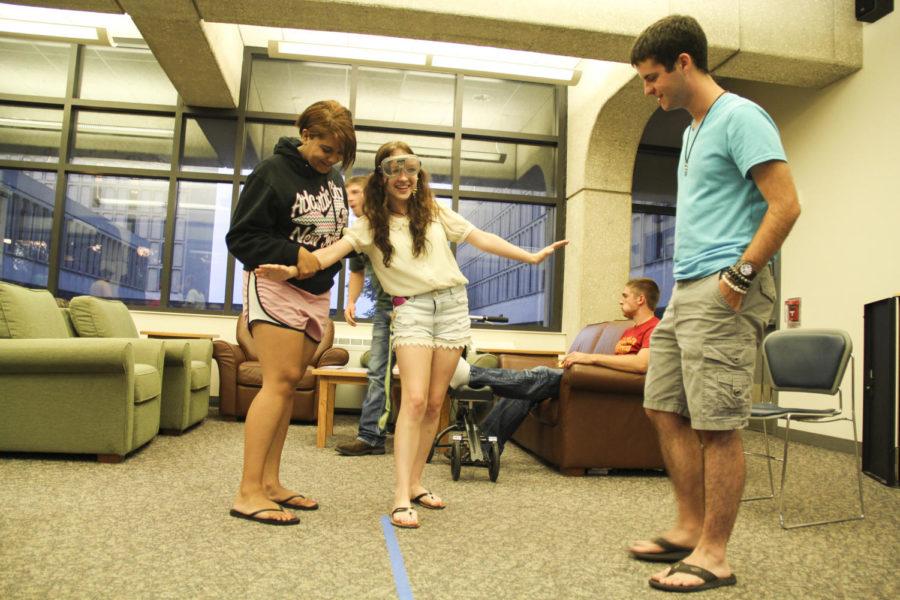Police interact with students, discuss alcohol safety
Danielle Ferguson/Iowa State Dai
Freshman Anna Hubbard tries to walk in a straight line while wearing drunk goggles at “Doughnuts with the Cops” on Sept. 3 at Maple Hall.
September 4, 2014
A night out in Campustown could end up costing a student $10,000.
ISU police officers Zach Deutmeyer and Julian Loera shared this statistic and more with Maple Hall residents on Sept. 3 at “Doughnuts with the Cops.”
Several boxes of doughnuts and coffee from Dunkin’ Donuts emptied as roughly 30 students gathered in the Maple Hall lounge for an opportunity to interact with Department of Residence liaison officers and learn more about alcohol awareness.
Deutmeyer, who has been a police officer for three years, said this was one of several outreach programs they have at each dorm.
“When people see us on the streets, they usually have a negative interaction with us,” Deutmeyer said. “We want to come out and do these types of programs to educate people and to let them ask us questions and have a positive interaction with us. We can joke around with them, answer some questions that they have and dispel some myths in a controlled environment.”
Deutmeyer discussed common alcohol-related offenses, including charges for possession of alcohol under the legal age, public intoxication and operating while intoxicated as well as the repercussions associated with each.
With public intoxication, Deutmeyer said that he and the other officers look at people as being a danger to themselves, to others and to property. He said that for each person, the level of tolerance can be different and that officers assess each situation on a case-by-case basis.
“We try to be reasonable in everything that we do,” Deutmeyer said. “We don’t necessarily want to arrest anyone … There’s a lot of paperwork that goes into making an arrest. I’d rather send you guys home.”
Deutmeyer also shared the officers’ responsibility to reduce the liability of the police department and the university.
“We don’t want someone going and dying because we decided we’re going to try and let them walk home,” Deutmeyer said. “I would much rather arrest you for the night and you be mad at me than have you go and die.”
Deutmeyer has dealt with such situations.
“I’ve had to deal with dead bodies,” he said. “It’s not the fun part of my job. The fun part is to come here and try to educate you guys.”
Andrea Kastorff, senior in kinesiology and health, has been a community adviser for three years and said she sees the immense value in educational programs.
“It’s a great chance for residents to get to see the police in a positive light and for them to know that the police are here to look out for them,” Kastorff said. “A lot of the residents haven’t been around alcohol in this capacity before … So if we can educate them on safe practices for alcohol, then they’re more likely to succeed here and that’s what we want.”
Sophomores Jason Wingert and Chance Gustafson said they were most surprised to learn that cops won’t necessarily arrest each person they stop on the street for drinking.
“I was surprised that they said that if you were in control, they would let you go on your way,” said Wingert.
Gustafson agreed.
“After learning more about all of the facts they shared, I’ll probably be more careful when I go out,” Gustafson said.
Deutmeyer also told the students the importance of going out with a good group of friends.
“I can’t tell you how many times I’ve came up to somebody and they’re passed out on an elevator, in a creek, in the middle of the hallway, where their friends just left them,” Deutmeyer said. “Go out, have fun, but be smart. Have friends that will be brave enough to say you’ve had enough.”
Melissa Hulme, Maple Hall director, said they like to bring in these types of educational programs to help students make more informed decisions.
“We think it’s important because our students are at a point where they’re experimenting,” Hulme said. “We know that they’re going to make choices about alcohol and we want to give them information to help them make informed decisions.”

















